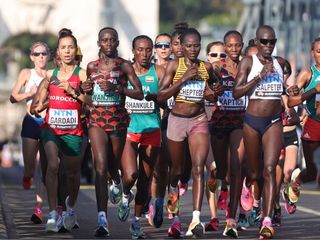Violence against women is a global epidemic—this week's headlines are further proof


Trigger warning: this article contains distressing themes of physical and sexual violence
Violence against women is a worldwide epidemic, with gender-based crimes, particularly intimate partner violence, seeing a devastating rise in recent years.
According to new data from the World Health Organisation, 1 in 3 women worldwide have been subjected to either physical and/or sexual violence in their lifetime. Most of these cases have been intimate partner violence.
Earlier this year the National Police Chiefs' Council declared that violence women and girls a national emergency. And, we can't forget the tragic stories of Sarah Everard and the fact that domestic violence cases continually soar across football tournaments.
The past week, however, has seen such violence platformed on a global scale, with two particularly harrowing cases unfolding before the world.

Ugandan Olympic athlete Rebecca Cheptegei died in hospital this week, days after she was covered in petrol and set on fire in a violent attack allegedly committed by her boyfriend, Dickson Ndiema. The 33-year-old sustained burns over 75% of her body and died of organ failure—a result of her catastrophic injuries.
Cheptegei's tragic case is a stark reminder of the gender-based violence crisis in Kenya, with a 2022 national survey reporting that at least 34% of women had experienced physical violence. And in the sporting community, Cheptegei has become the fourth female athlete to be killed by a male partner in Kenya over the last three years.
Marie Claire Newsletter
Celebrity news, beauty, fashion advice, and fascinating features, delivered straight to your inbox!
The high profile nature of this case has the potential to make it a turning point in combatting gender-based crimes in the country and beyond.

Meanwhile, in France, one of the biggest and most prolific rape trials in recent years is unfolding, with Dominique Pélicot, 71, accused of drugging his wife of 50 years and inviting over 80 men to rape her over the course of a decade.
Pélicot, and 50 other men, aged 22 to 70, are currently standing trial on charges of aggravated rape against 72-year-old Gisèle Pélicot, who has waved her right to anonymity and asked that the trial be held in public.
The distressing case is still ongoing, and with Pélicot voicing her drive to help spare other women from similar ordeals, there are hopes that it could affect real change, adding the notion of consent to France's rape law.

According to UN data, an estimated 736 million women globally have been subjected to physical and/or sexual violence at least once in their lifetime. And 15 million adolescent girls worldwide (aged 15–19 years old) have experienced forced sex.
Here in the UK, a woman is killed by a man every three days, with 50 women already killed this year, and violence against women and girls has now been declared a national emergency.
These are the facts, and they are truly shocking. Violence against women may be an uncomfortable truth, but it is also a global emergency.
We need to break the cycle of silence and continually talk about violence against women. Only then can we affect real change, and ensure that tragic cases like that of Rebecca Cheptegei and Gisèle Pélicot never happen again.
If you are experiencing domestic abuse or are worried about someone you know, contact the free 24-hour National Abuse Helpline on 0808 2000 247. If you are in an emergency situation, please call 999.

Jenny Proudfoot is an award-winning journalist, specialising in lifestyle, culture, entertainment, international development and politics. She has worked at Marie Claire UK for seven years, rising from intern to Features Editor and is now the most published Marie Claire writer of all time. She was made a 30 under 30 award-winner last year and named a rising star in journalism by the Professional Publishers Association.
-
 Jennifer Lopez wants to “make over her image” following Ben Affleck divorce
Jennifer Lopez wants to “make over her image” following Ben Affleck divorceBy Jenny Proudfoot
-
 The White Lotus cast's words about the upcoming season are going viral
The White Lotus cast's words about the upcoming season are going viralBy Jenny Proudfoot
-
 A landmark new Ozempic study claims the drug can "delay ageing" - but top experts warn it's not that simple
A landmark new Ozempic study claims the drug can "delay ageing" - but top experts warn it's not that simpleA deep dive.
By Ally Head